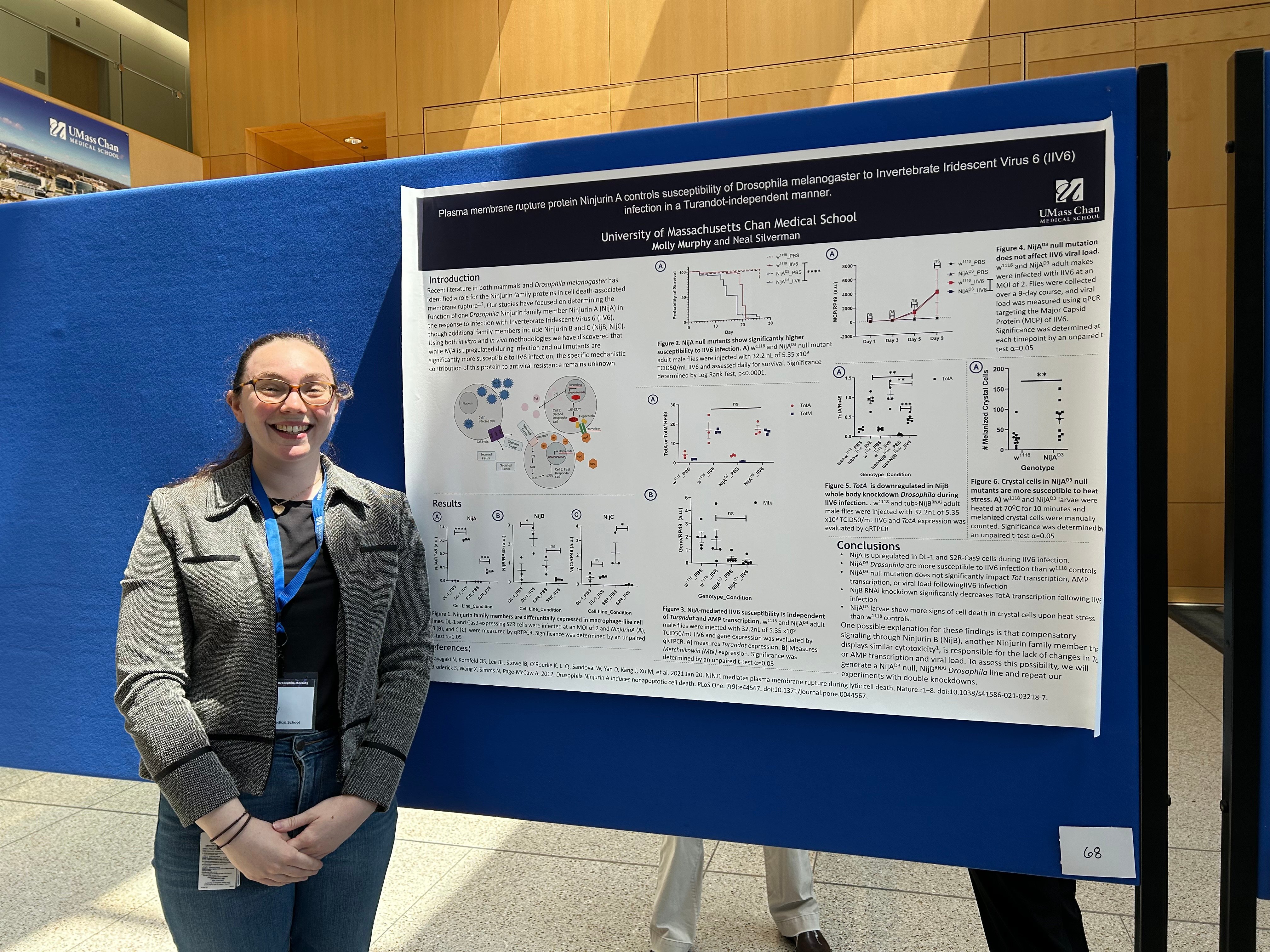Recent News
News highlights
October 2024: Dr. Silverman in collaboration with Drs. Soojin Lee and Fen-Biao Gao of the UMass Chan RNA Therapeutics Institute, explore the relationship between antimicrobial peptides (AMPs) and sleep regulation, memory formation, as well as traumatic brain injury in neurodegenerative diseases in their recent review in Trends in Neurosciences.
June 2024: Dr. Silverman has received R21 funding for his project, “Mechanistic Investigation of Innate Immunity in a Drosophila Model of Frontotemporal Dementia.” In the project, Drs. Silverman, along with Fen-Biao Gao, PhD, of the Department of Neurology and the RNA Therapeutics Institute, will use a drosophila (fruit fly) model of ALS to investigate the role of antimicrobial peptides in disease progression and begin to translate these findings into humans using iPSC-derived neuronal models.
 May 2024: Molly Murphy, a graduate student in the lab, presented her research at the Boston Area Drosophila conference at UMass Chan Medical School on May 21, 2024.
May 2024: Molly Murphy, a graduate student in the lab, presented her research at the Boston Area Drosophila conference at UMass Chan Medical School on May 21, 2024.
Her poster was titled, "Plasma membrane rupture protein Ninjurin A controls susceptibility of Drosophila melanogaster to Invertebrate Iridescent Virus 6 (IIV6) infection in a Turandot-independent manner."
April 2024: New Study Shows Transcription Factor IRF5 Initiates IL-12 Response Central in Controlling Toxoplasmosis. Members of the Silverman, Golenbock, and Gazzinelli labs in the Division of Infectious Diseases and Immunology, and the Fitzgerald lab in the Division of Innate Immunity, recently collaborated on a paper, “The IRAK1/IRF5 axis initiates IL-12 response by dendritic cells and control of Toxoplasma gondii infection.” Published in Cell Reports at the end of February, the paper describes the importance of different IRAK proteins in initiating IL-12 production and host resistance to acute infection with T. gondii. Using mouse infection models, study investigators found that in murine dendritic cells, the IRAK1/IRF5 axis drives the production of key inflammatory molecules such as IL-12, CCL5, and TNF. IRF5 activity is then further modulated by CNBP, a nucleic acid binding protein. Their findings show that IRF5 is a central factor in controlling parasitic infections, like T. gondii, via the production of IL-12. Read more.
Previous headlines
March 2023: Dr. Silverman and collaborators publish their study, "Downregulation of Hsp90 and the antimicrobial peptide Mtk suppresses poly(GR)-induced neurotoxicity in C9ORF72-ALS/FTD," in Neuron. Read more.
December 2022: Dr. Silverman, along with collaborators from the Duke University School of Medicine and the Shanghai Institute of Biochemistry and Cell Biology, recently had their work, “Retrotransposon Activation During Drosophila Metamorphosis Conditions Adult Antiviral Responses,” published in Nature Genetics. Read more.
October 2022: Scientists in the Silverman Lab, Program in Innate Immunity publish new findings on the role of transporter SLC46A2 on psoriatic skin inflammation. Read more.
July 2022: We are thrilled that campus life has started to return to normal and we are able to welcome interns back to our lab this summer, for the first time since 2019! Joining us in the Silverman Lab are Tess Keppel and Zubin Nawab.
March 2022: Researchers in the Silverman lab have published novel study “Leishmania amazonensis sabotages host cell SUMOylation for intracellular survival.” New findings in pre-print on bioRxiv
August 2021: Dr. Silverman received competing renewal for the NIH-funded T32 training grant: Innate Immunity Training Program (IITP) at UMass Chan Medical School, for which he is the Program Director. Learn more about the IITP.